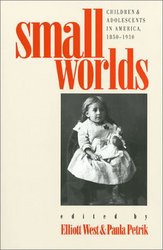Description
This essay discusses the importance of studying children in order to understand adult behavior. It discusses how children have been influential in American economic life and how their values evolve over time.
Historians have been guilty of child neglect. Yes, they've studied children, but only to learn about adults. Typically they've chosen adult-centered research topics like child-rearing practices, social attitudes toward children, and the evolution of public institutions like education and juvenile courts. The thirteen essays in Small Worlds take a different tack. They treat children as active, influential participants in society. Here children and adolescents from the pre-Civil War generation to 1950 are seen as actors in their own right, shapers of their own history who not only mirror adult values, but also modify them. Editors Elliott West and Paula Petrik have organized the essays in Small Worlds around four topics: cultural and regional variations, toys and play, family life, and the ways evolving memories of childhood shape how adults think of themselves. And, since photography provides the best record of childhood, they've added a photographic essay by Ray Hiner entitled "Seen but Not Heard." "A youthful perspective on the past can provide a much better understanding of changes in American material and economic life," write West and Petrik. Young people, they argue, performed many of the essential jobs in newly industrialized America, and they continued to play vital roles on their families' farms well into the twentieth century. As a result, children have been increasingly influential in American economic life--as consumers. According to West and Petrik, the study of children also reveals how values evolve out of the mutual give-and-take between society and child in the socialization process. This enormously complex evolution continues as the child matures and, in turn, tries mightily to pass on values to a new generation of children who work just as strenuously to make up their own minds.
